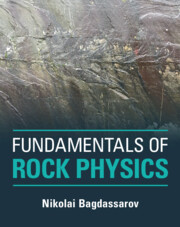Book contents
- Fundamentals of Rock Physics
- Fundamentals of Rock Physics
- Copyright page
- Dedication
- Contents
- Preface
- 1 Introduction
- 2 Density and Porosity
- 3 Stresses in Rocks
- 4 Mechanical Strain and Elastic Moduli
- 5 Permeability of Rocks
- 6 Mechanical Properties of Fluid-Bearing Rocks
- 7 Acoustic Properties of Rocks
- 8 Electric Resistivity
- 9 Dielectric Properties
- 10 Magnetic Properties of Rocks
- 11 Thermal Properties of Rocks and Minerals
- 12 Radioactive Properties of Rocks
- Index
- References
8 - Electric Resistivity
Published online by Cambridge University Press: 19 November 2021
- Fundamentals of Rock Physics
- Fundamentals of Rock Physics
- Copyright page
- Dedication
- Contents
- Preface
- 1 Introduction
- 2 Density and Porosity
- 3 Stresses in Rocks
- 4 Mechanical Strain and Elastic Moduli
- 5 Permeability of Rocks
- 6 Mechanical Properties of Fluid-Bearing Rocks
- 7 Acoustic Properties of Rocks
- 8 Electric Resistivity
- 9 Dielectric Properties
- 10 Magnetic Properties of Rocks
- 11 Thermal Properties of Rocks and Minerals
- 12 Radioactive Properties of Rocks
- Index
- References
Summary
Electrical conductivity and resistance obey Ohm’s law. Specific resistance may be measured in two- or four-electrode schemes. Mechanisms of electrical conductivity in rocks are ionic, electronic, anionic and protonic. Some mantle minerals, i.e. olivine, possess polaron conductivity. Conduction bands and density of states are considered for some minerals. Effective conductivity in heterogeneous rocks can be estimated from Wiener or Hashin–Shtrikman bounds, effective medium approximation (EMA) and resistor network models. The electrical conductivity of mineral aggregates can be effectively described by brick and percolation models. Diluted electrolytes and Kohlrausch’s law of independent movement of ions are considered in fluid-bearing rocks, whose electric conductivity obeys Archie’s law. Formation factor and cementation exponent are analyzed for sedimentary rocks. The relationship between rock conductivity and pore saturation is described by the Waxman–Smith model. Focus Box 8.1: Calculations of density of states (Fermi gas model). Focus Box 8.2: Reciprocal lattice and band gaps. Focus Box 8.3: Olivine structure.
Keywords
- Type
- Chapter
- Information
- Fundamentals of Rock Physics , pp. 292 - 360Publisher: Cambridge University PressPrint publication year: 2021

